
The conference invited practitioners from Hong Kong, Singapore and Taiwan to share their success stories in creating an age-friendly model.
(12 April 2019, Hong Kong) The Chinachem Sustainability Conference 2019, organised by the Chinachem Group in partnership with the Hong Kong Green Building Council (HKGBC), took place in the Chiang Chen Studio Theatre, The Hong Kong Polytechnic University, on 29 March 2019.
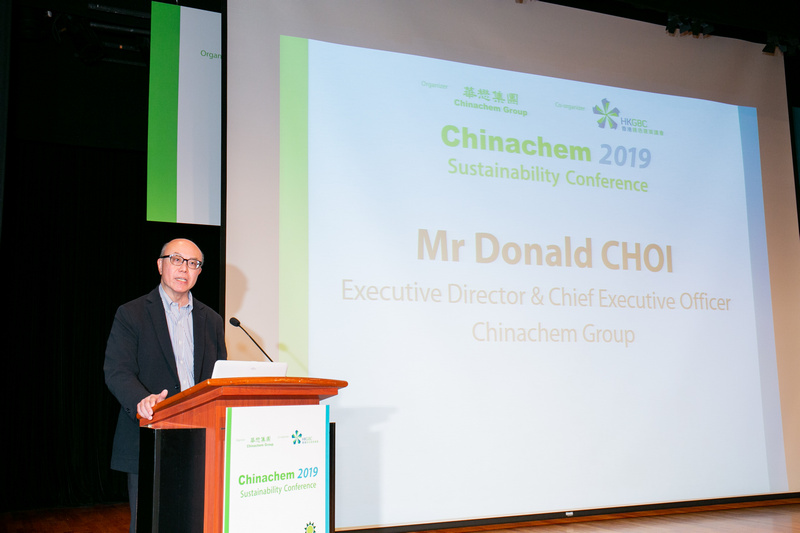
Mr Donald CHOI, Executive Director and Chief Executive Officer of Chinachem Group, addressed an imminent need to tackle the double-ageing problem – population and buildings – faced by Hong Kong in the coming two decades.
With the theme of “Sustainable Neighbourhood: How to Foster Age-Friendly Developments”, the conference brought together practitioners and experts in elderly care and services, urban planning, architecture, and Information and Communication Technology (ICT) from Hong Kong, Taiwan and Singapore, to exchange constructive ideas of technical solutions to the city’s critical issue – ageing population, and attracted 380 attendees for the morning and afternoon sessions.
Mr Donald CHOI, Executive Director and CEO of Chinachem Group, inaugurated the conference by making a welcome speech and addressing an imminent need to tackle the double-ageing problem – population and buildings – faced by Hong Kong in the coming two decades. Guest of Honour Mr Michael WONG, JP, Secretary for Development, then made a keynote on the housing policies and land development projects that the Government is now working on in view of its urban renewal strategy to the entire city and growing population. Mr WONG also prospected that with joint efforts from various sectors, Hong Kong would become a more inclusive and supportive city for senior citizens.
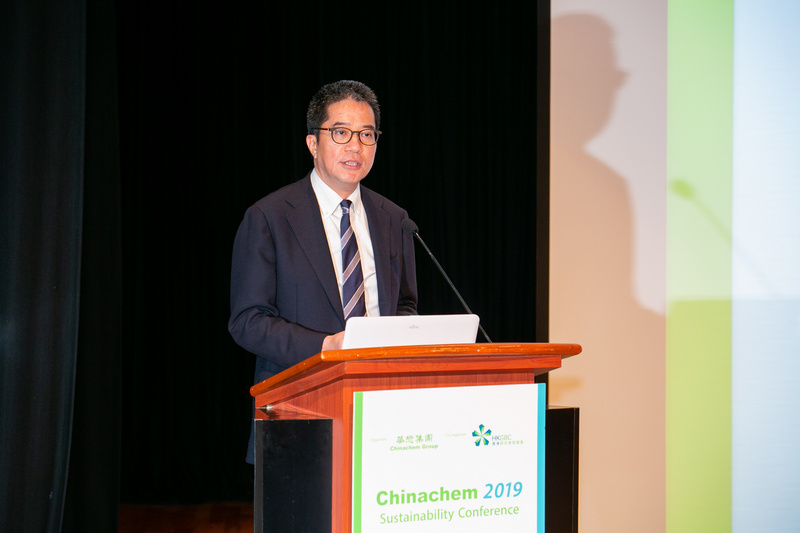
Guest of Honour Mr Michael WONG, JP, Secretary for Development, introduced the current housing policies and land development projects from the Government in view of its urban renewal strategy and growing population.
The conference was honoured to have nine respectable speakers sharing their perspectives and bringing insights into how innovative architectural design, smart system and comprehensive site planning could be leveraged and integrated to create an age-friendly neighbourhood, making both morning and afternoon sessions very rewarding.
The morning session invited representatives from the public sector, including Ms Amy CHEUNG, Assistant Director/Territorial of the Planning Department, who explained the government’s strategic plan to the city and some of the Department’s works in building an age-friendly environment. From a humanistic perspective, Dr Vivian LOU, Member of The Elderly Commission, introduced the challenges in face of ageing, current initiatives, and how the city could progress towards an age-friendly sustainable development by putting forth pertinent policies.
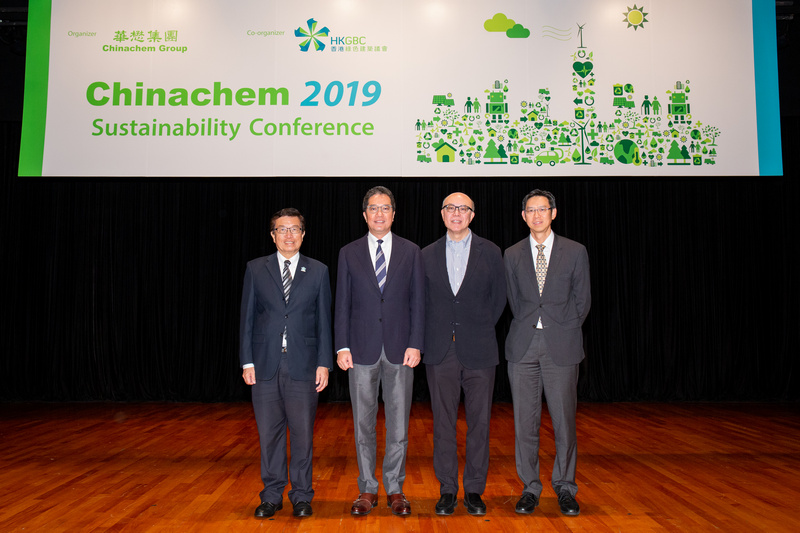
Guest of Honour and Conference Hosts officiated the commencement of the Chinachem Sustainability Conference 2019 – (from left to right) Mr CHEUNG Hau-wai, Chairman of Hong Kong Green Building Council; Mr Michael WONG, Secretary for Development; Mr Donald CHOI, Executive Director and CEO of Chinachem Group; and Mr WONG Hung-han, COO of Chinachem Group.
On this foundation, the session stepped further to inspire audience with some humane architectures and design solutions, such as homely interior design and the “ageing-in-place” concept, to facilitate senior and healthcare needs in housing shared by Mr Patrick CHUI, Director of Ronald Lu & Partners. He also highlighted an example of senior housing development in Australia which is well equipped with various community and healthcare facilities and is able to take care of seniors both physically and psychologically. Deputy Chief Executive Officer of the Hong Kong Housing Society (HKHS), Mr James CHAN, further elaborated the importance of applying the “ageing-in-place” concept in senior housing and showcased some existing senior residences in Hong Kong, including Chung Ning Sheh of Cho Yiu Chuen in Kwai Chung. A corresponding scheme, known as the AIP Scheme, has already been implemented by the HKHS since 2012, aiming to bring senior residents health, safety and happiness in their later years.
With the underpinning for an age-friendly society, a panel discussion, moderated by Mr LING Kar-kan, underscored the challenges and opportunities brought by it as they often went in pair. The panel discussed that comprehensive town planning shall work in tandem with stakeholders to balance economic, environmental and social considerations in the course of development. It is also essential to build an impartial and integral society while meeting the needs of the elder and younger generations.
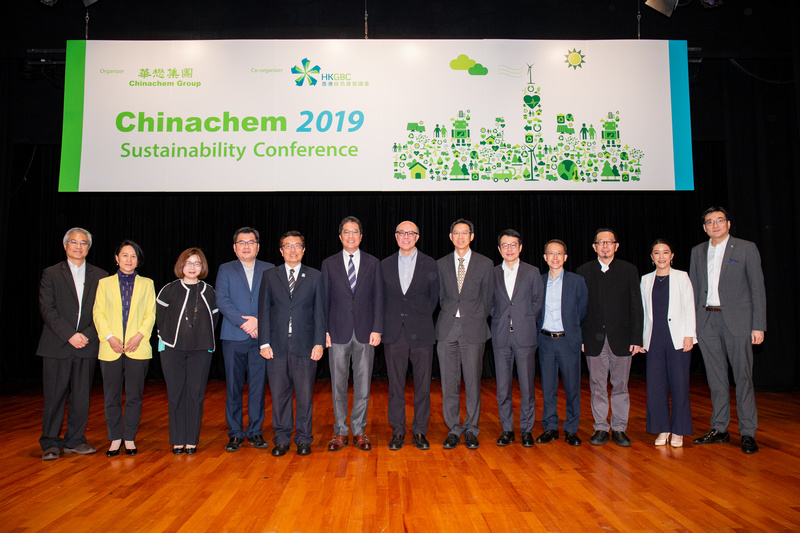
Guest of Honour, Conference Hosts together with Speakers & Moderators celebrating for the success of the conference. (from left to right) Mr LING Kar-kan, Former Director of Planning Department, Vice Chairman of Supervisory Board Members of Hong Kong Housing Society, Director of Jockey Club Design Institute for Social Innovation and Professor of Practice (Planning) of The Hong Kong Polytechnic University; Dr Vivian LOU, Member of The Elderly Commission; Ms Amy CHEUNG, Assistant Director/Territorial of Planning Department; Mr Jaffrey AW, Director (Strategic Planning) of Housing & Development Board, Singapore; Mr CHEUNG Hau-wai, Chairman of Hong Kong Green Building Council; Guest of Honour, Mr Michael WONG, Secretary for Development of the Government of HKSAR; Mr Donald CHOI, Executive Director and CEO of Chinachem Group; Mr WONG Hung-han, COO of Chinachem Group; Mr James CHAN, Deputy Chief Executive Officer of Hong Kong Housing Society; Mr Patrick CHUI, Director of Ronald Lu & Partners; Mr Ricky LIU, Principal Architect of Ricky Liu & Associates; Ms Queenie MAN, Director of Corporate Strategy, Culture Homes and Dr William YU, CEO of World Green Organisation
Commencing the afternoon session was a series of experience sharing from success cases in Hong Kong, Taiwan and Singapore. Mr Jaffrey AW, Director (Strategic Planning), Housing & Development Board, Singapore brought to the audience the Country’s public housing stories in the last six decades, its broad planning principles and frameworks that guide the country to create liveable and sustainable towns, and the way to embrace the elderly population and meet their needs through planning, design policies and programmes, such as inter-generational bonding, with an aspiration to build “age-proof” towns and provide a good quality of living for all ages in the country. As for Hong Kong, the Executive Director of Longevity Design House, Mr Lawrence LUI, talked on how he decided to create innovative design services to renovate homes for aged people after his personal experience in taking care of his father’s illness. Ms Queenie MAN, Director of Corporate Strategy from Culture Homes offered insights into developing a sustainable ecosystem for seniors’ living through operating elderly nursing homes and distributing rehab products and services in Greater China. Applying smart system and technology for sustainable development is another topic receiving close review. Hong Kong Science & Technology Parks Corporation’s Ms Gracie NG, the Associate Director, ICT Cluster & Smart Platform, took the stage to describe smart city trends and the current buildings’ condition together with technology level in town that were awaited to enhance. From then, the city could apply smart system to raise productivity and facilitate the everyday life of the senior citizens. A case study of culture village in Taiwan presented by the Principal Architect from Ricky Liu & Associates marked the last presentation. Mr LIU introduced the village, its market position, design principle, as well as social activities in which senior citizens could take part inside in order to maintain their independence and self-esteem. The winning case also proved the importance of strategic site selection to address the integration between the village and the surrounding neighbourhood.
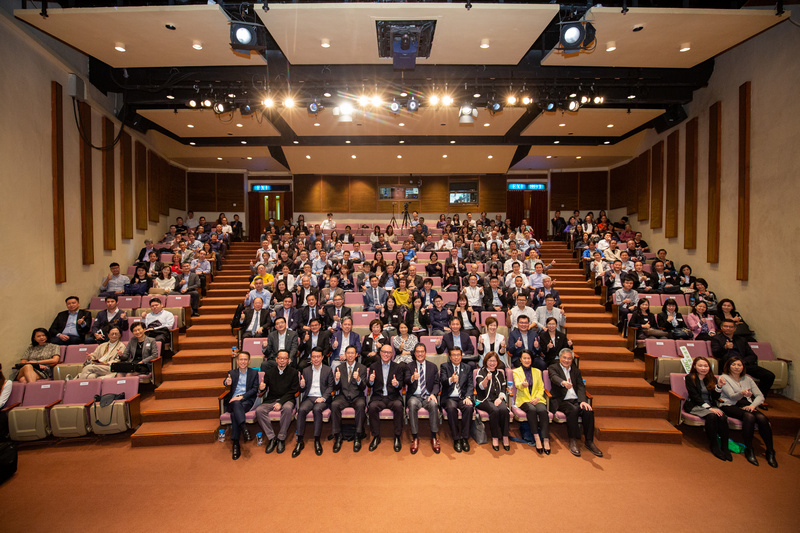
The honoured guests took a group photo together with a full-house of participants.
Coming to the end of the conference, a second round of panel discussion was moderated by Dr William YU to scrutinise how an ageing population could turn out to be a competitive advantage for the society at large. Mr CHEUNG Hau-wai, Chairman of HKGBC, closed the conference. “Transforming our city into an age-friendly sustainable environment shall be a collective effort. By working closely with the government and the industry, the Council has been striving diligently for the sustainable development of our built environment,’ he said. With collaborative insights and efforts from all speakers, industry players and the government, HKGBC is hopeful of seeing elderly in Hong Kong age gracefully and will continue to work with different sectors to transform the city into an age-friendly society.












